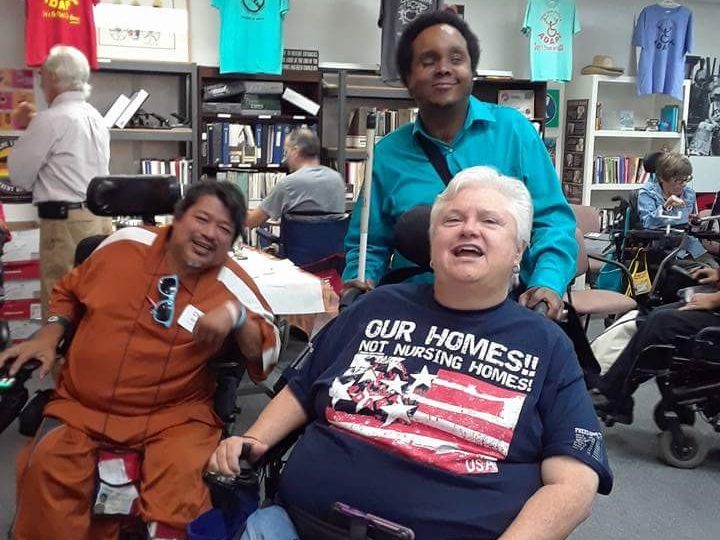Rebel in a wheelchair: The ADA at 30 in the rearview mirror
Written by Nancy Crowther
I never thought I would make it this far, much less this long. July 26, 2020 marks the 30th anniversary of the Americans with Disabilities Act. Often referred to as the most comprehensive civil rights act for persons with disabilities. Ever.
I made a few contributions to the outcomes. I am a trailblazer, after all. The lawsuit against UT in relation to inaccessible shuttle bus service got the ball rolling in 1983, then sidewalk access design and construction came forth, then training in eligibility for paratransit, and my favorite, travel training – just to name a few.
When I was growing up in Killeen, Texas, I knew I was different. It was not until the wheelchair showed up when I was 6 years old that I knew things were changing. Why did I have to use this? None of my three sisters had to use one. Unlike their rites of passage with two-wheeled bicycles, I was given this four-on-the-floor rolling chair powered by my hands pressing on the wheel rims. It was bulky, ugly, and took a strong person to fold it up and put in the trunk of the car before I could go anywhere.
Little did I know how much it would change the way the world would treat me.
What? Riding to school in an ambulance? To junior high school?
Why? There were no rides on the yellow bus for me. No “short buses” for students with disabilities then.
It got to be fun after a while, except that everyone knew when I arrived and when I left. It was Standard Operating Procedure to have the lights flashing when I was boarding or de-boarding the van. This did nothing for my social life or my self-esteem.
Fast forward, I graduated from UT (even surprised myself) after having whipped up the student population of people with disabilities to recognize the massive injustice that was prevalent on campus. Missing ramps to buildings, having to change classrooms for access at the beginning of each semester, UT’s attitudes toward “rebels in wheelchairs.”
Eventually I ended up in federal court to defend my rights to ride shuttle buses. Something I learned from my father was to never take no for an answer. I wanted access to the shuttles. We lost the battle (David and Goliath, what was I thinking?) but won the war when access to shuttle service was mandated in the ADA. This experience molded my focus toward justice and access, not just for me but my comrades with disabilities.
Being an untraditional social worker, a role I relished, I managed to get a job at Capital Metro in 1989 (no, I did not drive a bus) as an Accessible Transportation Specialist – a title that meant if it had to do with disability, give it to Nancy.
Then in 1990, the ADA became law. Suddenly, we had laws and regulations to implement. I was placed in charge of the Department of Transportation rules for implementing the regulations for Capital Metro’s compliance under the ADA and access to services for people with disabilities. Uh, I don’t remember learning how to do that in school.
From bus access designs for maximum accessibility, testing and design for safely securing wheelchairs, accessible bus stops and signs, driver customer service training, paratransit planning, community outreach, and all the nuts and bolts that went into making transportation truly accessible to all persons with all different disabilities. As early as 1993, Capital Metro became the first transit authority in Texas to become 100 percent wheelchair accessible. I was a maestro to an orchestra of thousands who made this happen. Never a prouder moment. And it grew to today with 30 years in the rearview mirror. The hardest battle to fight, but I didn’t take no for an answer.
Nancy Crowther continues improving justice and access for people with disabilities through her work with ADAPT of Texas, the Personal Attendant Coalition of Texas (PACT), and American Association of Retired People (AARP) Chapter 2426. She is a long-term member of SAFE Disability Services’ Program Advisory Committee.